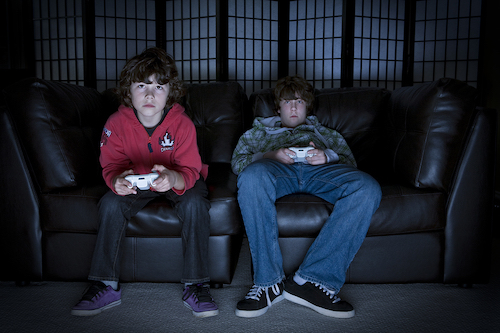 For many adolescents, video games are a fun way to spend time.
For many adolescents, video games are a fun way to spend time.
But recent research suggests that spending too much time in front of the screen playing video games can be responsible for negative developmental outcomes for adolescents and result in an addiction to video games.
“There is a large debate on whether video game addiction is real thing. Most of the studies are short-term in nature, so we wanted to find out the course of video game addiction over adolescence and emerging adulthood,” Sarah Coyne, PhD, lead author of the study and a professor of family life at BYU told Theravive.
Coyne’s research, the longest ever study on video game addiction, spanned six years and found that in the majority of cases, gamers do not play video games in a way that could have a negative long-term impact. 90 per cent of the gamers in the study played video games in a health way.
But some had an unhealthy relationship with video games.
“About 10 per cent of the sample showed high levels of video game addiction symptoms that increased over a six-year period. This group showed higher levels of depression, aggression, anxiety, shyness, and pathological cell phone use at the final wave, despite not being different on these variables on the initial wave,” Coy said.
Pathological gaming is a term used to describe a persistent and excessive use of video games that cannot be controlled. Roughly 10 per cent of gamers fall under this category. Compared to the 90 per cent of gamers who don’t have a video game addiction, the pathological gamers in the study showed greater levels of aggression, depression, shyness and problematic use of cell phones. The two groups were the same in all other possible variables at the commencement of the study, which suggests it was the video games that contributed to these negative outcomes.
“Most people who play video games have a healthy relationship with games. However, for a small minority, video games can become problematic over time. Our study found that it was associated with negative mental health, behavioral, and social outcomes over time,” Coyne said.
In undertaking the study, Coyne followed 385 adolescents during their transition into adulthood. Those involved in the study were asked to complete a questionnaire every year for a six-year period. The questionnaires were designed to measure aggression, anxiety, depression, empathy, delinquency, prosocial behaviour, sensory reactivity, shyness, financial stress and problematic cell phone use.
Coyne found the two main predictors of being addicted to video games were being male and having low levels of prosocial behaviour. Protective factors against being addicted to video games included having higher levels of prosocial behaviour or behaviours that would benefit another person.
Coyne says a person’s use of video games would be considered an addiction when it interferes with their ability to function in the real world. Nine symptoms of video game addiction include preoccupation with gaming, need to spend increasing amounts of time gaming, irritability or anxiety when unable to play, not being able to control gaming activity, use of video games as a coping mechanism, continued gaming despite problems, being deceptive about the amount of time spent gaming, lack of interest in other hobbies and conflict with others as a result of gaming. Coyne says if a person has five or more of these symptoms, they are considered addicted to video games.
Those studied fell into three trajectories of video game use. 72 per cent of the adolescents in the study had low symptoms of video game addiction during the six years of the study. 18 per cent of those studied began the six-year study with moderate symptoms of video game addiction, and this did not change throughout the six year study. 10 per cent showed an increase in symptoms of video game addiction during the six-year period of the study.
Coyne says just because an adolescent might be on one trajectory for their video game use doesn’t mean it has to stay that way.
“I strongly believe that people can get on a different trajectory. A number of studies have found that in the short-term if people can decrease their symptoms, then the negative outcomes tend to decrease as well. Most research has focused on Cognitive Behavioral (CBT) therapy, with some success – particularly when complimented with a CBT group for family members,” she told Theravive.
Elizabeth Pratt is a medical journalist and producer. Her work has appeared on Healthline, The Huffington Post, Fox News, The Australian Broadcasting Corporation, The Sydney Morning Herald, News.com.au, Escape, The Cusp and Skyscanner. You can read more of her articles here. Or learn more about Elizabeth and contact her via her LinkedIn and Twitter profiles.